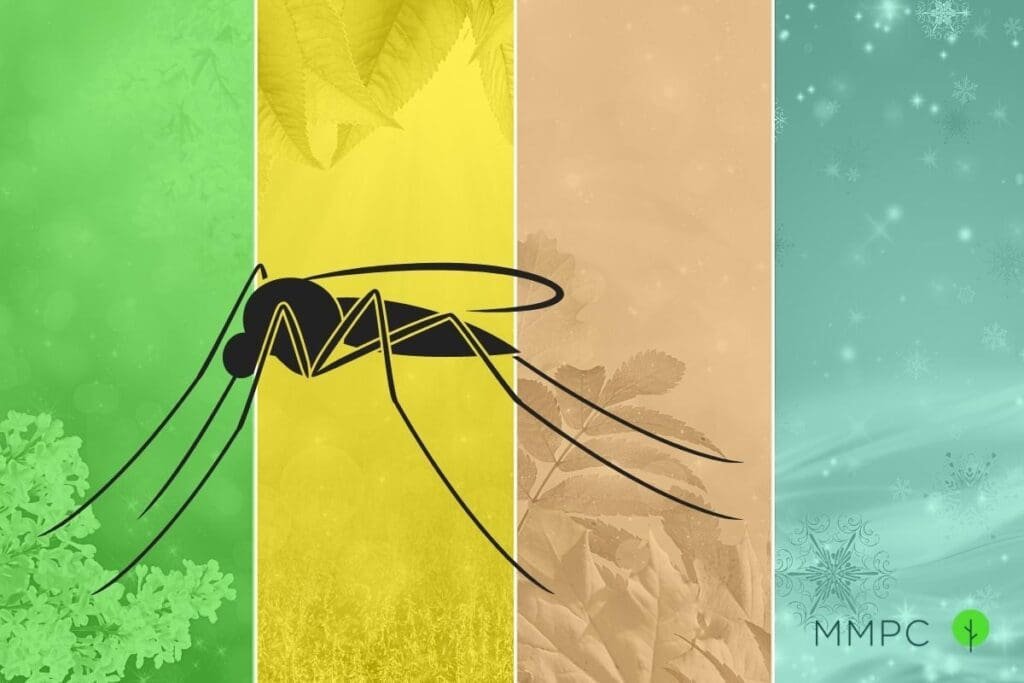
As temperatures rise, so does the yearly uptick in the number of diseases due to mosquito and tick bites.
Mosquitoes and ticks have always been problematic in New York City and across the East Coast, but their numbers seem to have risen dramatically in recent years.
Understanding when mosquito and tick season starts and taking precautions to eliminate these pests from your property can help you avoid getting itchy—and potentially disease-transmitting—bites in 2023.
Mosquito and Tick Activity Forecast for 2023
Mosquitoes and ticks are both cold-blooded pests that thrive in warmer temperatures, which is why mosquito and tick season usually lasts throughout the spring, summer, and fall.
- Mosquito Season in 2023: April–October
- Tick Season in 2023: March–November
Last year, the NYC Department of Health recorded record levels of mosquito activity, along with cases of mosquito-borne disease like West Nile virus. Tick populations, along with cases of Lyme disease, have similarly been on the rise in New York.
This year, we expect mosquito and tick activity in NYC to be at similarly high levels compared to 2022.
When is Mosquito Season in 2023?
In most years, peak mosquito activity occurs from April through October when temperatures rise above 50 °F. That’s the temperature threshold at which mosquitoes start to come out of hibernation.
According to Almanac, the average temperature for New York, NY in April 2023 is expected to be around 51 °F this year, which is when mosquitoes become active.
This summer is also expected to be wetter than usual as well, with above-normal precipitation levels from May to July. Rainfall is an important predictor of mosquito population growth, since their larvae require standing water in order to develop into adult mosquitoes.
The good news, though, is that August, September, and October will be on the drier side. As long as outdoor standing water is properly drained and removed in a timely manner, the city will hopefully see mosquito levels leveling off in the fall.
One of the best ways to control mosquitoes on your own property is to reduce areas where stagnant water collects. Above ground swimming pools, for example, are a common target for breeding mosquitoes in residential neighborhoods. Mosquitoes can also breed in small amounts of water retained in the foliage of plants and flowers.
When is Tick Season in 2023?
Ticks can be active any time of the year when temperatures are above freezing, but they’re most active above 45 °F. Thus, New York’s tick season coincides closely with mosquito season. This year it will most likely start in March and end around November.
Unlike mosquito season, tick season can be further split up into three parts based on their 2-year life cycle.
In the early spring, from March to late April, adult ticks are the most prevalent and active. They emerge from hibernation and start feeding as soon as temperatures rise. These adult ticks lay their eggs around the end of spring before dying.
The summer, especially around June and July, is primarily the active season for nymphs (immature ticks that have not yet developed into adults). These nymphs develop from larvae hatched from eggs in the previous year (not the newly-laid eggs). This is when you should be on the highest alert, since most humans infected by Lyme disease got it after being bitten by nymphal ticks according to the CDC.
Adult tick activity peaks for a second time in the fall, from mid-August to November, when the newly-fed nymphs develop into adults. Continue being wary of ticks during this time, as adult ticks are also capable of transmitting diseases.
The main difference between nymphs and adults in this regard is that adult ticks are much larger in size, so it’s easier to discover and remove them before they transmit the disease-causing bacteria.
Tick activity is also directly correlated with the population trends of their vectors, especially rats and field mice. Because rodent sightings have significantly increased in New York City, we’re expecting to see more activity than usual during tick season in 2023.
Backyard Mosquito and Tick Prevention Tips
Eliminate standing water whenever possible to remove potential mosquito breeding spots and avoid attracting tick-carrying wildlife. Cover or treat ponds, fountains, and other water fixtures with BIT, an eco-friendly way to kill mosquito larvae.
Keep your yard well-maintained to prevent mosquitoes and ticks from becoming established.
- Mow lawns regularly
- Trim bushes
- Rake up leaves
- Clear tall grasses and brush
- Don’t overwater plants
- Remove dead plants
- Stack wood neatly and in a dry area
- Clear out old furniture, mattresses, and other clutter
Use eco-friendly pesticides and yard sprays if necessary. Before spraying, always follow label instructions.
Lastly, when enjoying time in the sun, cover yourself up in light-colored, loose clothing and use insect repellent on exposed skin to protect yourself from mosquito and tick bites.
MMPC: Professional Mosquito & Tick Control in NYC
At MMPC, we have a knowledgeable and experienced team of pest professionals that can help keep mosquitoes and ticks off your property all year long, using eco-friendly pest control methods that are safe for families with children and pets.
Call or contact us today for more information about our professional mosquito and tick treatment programs.
